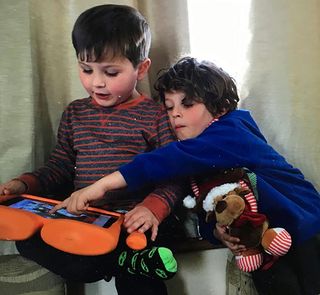Technology and the workplace of the future
As new inventions continue to change the way we live and work, what might the office look like in years to come?
Future tech at work and at home
While there are many legitimate concerns, especially among those in industries that rely on skills being rapidly overtaken by AI and other technologies, there are also many reasons to be optimistic about the future of the workplace, both from a financial perspective -- with increased efficiency saving on costs -- and on a more basic level in terms of office culture and the ability to work from anywhere.
To understand how people view technology in now and what they expect to see in future, we asked people across several generations about their perception of technology and how they think thing will progress in the next 10 to 20 years both at home and in the workplace.
Shaun, 4

For Shaun, technology amounts to one thing -- TV -- but beyond this his ideal vision of tech is very centered around what it can help people get done around the house. When asked what his favourite thing was, he answers "robots," which would help him decorate his home and water the garden. In the future, he thinks, "robot iPads" will make the dinner and do the cleaning so that humans don't have to, and -- much like people in the 1960s had predicted - flying cars will be commonplace.
Tian, 7

As children start school, it seems that their idea of technology begins to get a little more ambitious. For Tian, technology is what helps you get things done, and iPads, computers, TV and remote controls are items essential to everyday life. Laptops allow her to type, play games and do PowerPoint presentations for school, but "you need a lot of battery". In the past, she says, technology didn't really work due to that fact we didn't have any electricity, and in the future things we have now such as the microwave, oven and fridge will "have more technology".
Patrick, 18
Get the ITPro. daily newsletter
Receive our latest news, industry updates, featured resources and more. Sign up today to receive our FREE report on AI cyber crime & security - newly updated for 2024.

On the other side of formal education, Patrick understands technology as the "lifeblood of society," keeping us fed, alive and entertained. His phone helps him get around and, as a student entering university, he understands that he wouldn't have the same opportunities without his computer.
On technology of the past, he says, "[it] was a lot more basic and nothing like as advanced as it is today, but what feels hyper-modern and revolutionary may feel old and outdated just mere months later." In the future, however, the aesthetic of computers will have altered, and he believes that our homes and offices will be full of smart appliances.
Gemma, 25

Gemma sees her phone and laptop as her most valuable pieces of tech, as both help her to work and communicate. She uses the internet for research and learning, both in relation to her work as a writer and her hobbies. On the fast pace of change, she says: "As knowledge and science has advanced, the technology has advanced with it. I feel like technology has moved forward quite rapidly in my lifetime alone." In 10 to 20 years, she thinks new technology will save us time, money and resources and wearables could become much more prevalent.
Louise, 40

Technology is about techniques, whether that's human, machine or otherwise, says Louise, who works with the police. It helps with research and the improvement of knowledge or skill inside and outside of the workplace. In the past, technology was there but it was not as accessible, whereas today it's used by everyone in almost every area of their lives. Like most people, Louise believes robots and smart devices will become much more commonplace within the next 10 to 20 years and that this will result in far less direct face-to-face time between people.
Jacky, 60

"Technology is the use of knowledge or science used to enable us to solve problems or invent tools," says Jackie, who recently retired from work in a hospital and who relies on her car on a daily basis. In addition to using technology at work, it's also a part of home life with cooking, cleaning, travel and finding information. As such, she believes that 20 years in the future we will be living in fully-automated houses and driverless cars will be the norm. Travel and healthcare will also benefit, prolonging our lives and making getting around far more efficient.
Lyn, 71
According to Lyn, technology is supposed to bring advances to help people in their lives and their jobs. Having experienced many technological innovations in the past, she knows that everything is "good for its time" and it only takes the next invention to render the previous one outdated. Pointing to home automation as one example, she believes that we will eventually be dealing with holograms and AI at home and work, but believes strongly that "technology only goes so far; you will always need humans to correct their mistakes".
Caroline has been writing about technology for more than a decade, switching between consumer smart home news and reviews and in-depth B2B industry coverage. In addition to her work for IT Pro and Cloud Pro, she has contributed to a number of titles including Expert Reviews, TechRadar, The Week and many more. She is currently the smart home editor across Future Publishing's homes titles.
You can get in touch with Caroline via email at caroline.preece@futurenet.com.





